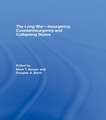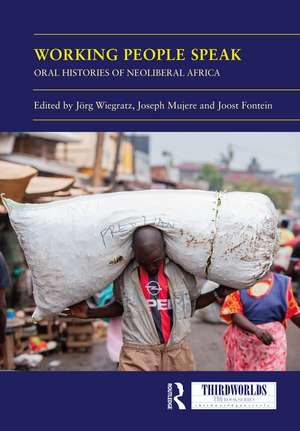Working People Speak: Oral Histories of Neoliberal Africa: ThirdWorlds
Editat de Jörg Wiegratz, Joseph Mujere, Joost Fonteinen Limba Engleză Hardback – 11 oct 2024
The last few decades have witnessed unprecedented changes in the working lives of people across the African continent. Oral historical accounts of working lives can offer unique and productive insights into these changes by allowing analyses of neoliberalism that focuses on personal experiences over the longue durée. Yet, there has been a surprising dearth of oral histories of work since the emergence of neoliberalism in the 1980s. Compared to scholarship published more than half a century ago, there has been a decline in the use of oral histories to explore experiences of living and working under capitalism. By grounding analysis in biographical details, histories, and dynamics, the chapters in this book seek better understandings of the wider life contexts, challenges, and circumstances in which people’s ‘agency’ emerges, unfolds, gains traction, and gets (re)shaped; and a better grasp of the multiple, entangled layers and temporalities of life and work in capitalist Africa. This book will be indispensable to students and researchers interested in political economy, development studies, anthropology, sociology, history and African Studies.
The chapters in this book were originally published as a special issue of Third World Thematics and are accompanied by a new Foreword and Afterword.
Din seria ThirdWorlds
-
 Preț: 310.85 lei
Preț: 310.85 lei - 13%
 Preț: 296.95 lei
Preț: 296.95 lei - 17%
 Preț: 272.50 lei
Preț: 272.50 lei - 26%
 Preț: 765.43 lei
Preț: 765.43 lei - 26%
 Preț: 763.78 lei
Preț: 763.78 lei - 12%
 Preț: 299.67 lei
Preț: 299.67 lei - 26%
 Preț: 765.84 lei
Preț: 765.84 lei - 12%
 Preț: 299.52 lei
Preț: 299.52 lei - 25%
 Preț: 796.65 lei
Preț: 796.65 lei - 17%
 Preț: 272.50 lei
Preț: 272.50 lei - 26%
 Preț: 822.34 lei
Preț: 822.34 lei - 25%
 Preț: 498.88 lei
Preț: 498.88 lei - 17%
 Preț: 178.76 lei
Preț: 178.76 lei - 15%
 Preț: 674.16 lei
Preț: 674.16 lei - 18%
 Preț: 1005.01 lei
Preț: 1005.01 lei - 13%
 Preț: 290.84 lei
Preț: 290.84 lei - 26%
 Preț: 764.20 lei
Preț: 764.20 lei - 12%
 Preț: 302.17 lei
Preț: 302.17 lei - 18%
 Preț: 1000.27 lei
Preț: 1000.27 lei - 26%
 Preț: 765.01 lei
Preț: 765.01 lei - 17%
 Preț: 178.76 lei
Preț: 178.76 lei - 26%
 Preț: 821.82 lei
Preț: 821.82 lei - 25%
 Preț: 526.41 lei
Preț: 526.41 lei - 26%
 Preț: 817.87 lei
Preț: 817.87 lei - 26%
 Preț: 848.57 lei
Preț: 848.57 lei - 17%
 Preț: 185.27 lei
Preț: 185.27 lei - 31%
 Preț: 324.59 lei
Preț: 324.59 lei - 22%
 Preț: 298.61 lei
Preț: 298.61 lei - 26%
 Preț: 763.78 lei
Preț: 763.78 lei - 25%
 Preț: 525.61 lei
Preț: 525.61 lei - 18%
 Preț: 1003.43 lei
Preț: 1003.43 lei -
 Preț: 272.20 lei
Preț: 272.20 lei - 26%
 Preț: 765.43 lei
Preț: 765.43 lei - 16%
 Preț: 223.88 lei
Preț: 223.88 lei - 18%
 Preț: 1001.84 lei
Preț: 1001.84 lei - 15%
 Preț: 671.56 lei
Preț: 671.56 lei - 26%
 Preț: 821.29 lei
Preț: 821.29 lei - 26%
 Preț: 764.62 lei
Preț: 764.62 lei - 18%
 Preț: 1001.84 lei
Preț: 1001.84 lei - 18%
 Preț: 1003.43 lei
Preț: 1003.43 lei - 26%
 Preț: 765.77 lei
Preț: 765.77 lei
Preț: 1002.60 lei
Preț vechi: 1222.68 lei
-18% Nou
Puncte Express: 1504
Preț estimativ în valută:
191.87€ • 199.10$ • 160.37£
191.87€ • 199.10$ • 160.37£
Carte tipărită la comandă
Livrare economică 18 martie-01 aprilie
Preluare comenzi: 021 569.72.76
Specificații
ISBN-13: 9781032743172
ISBN-10: 1032743174
Pagini: 196
Dimensiuni: 189 x 246 mm
Greutate: 0.52 kg
Ediția:1
Editura: Taylor & Francis
Colecția Routledge
Seria ThirdWorlds
Locul publicării:Oxford, United Kingdom
ISBN-10: 1032743174
Pagini: 196
Dimensiuni: 189 x 246 mm
Greutate: 0.52 kg
Ediția:1
Editura: Taylor & Francis
Colecția Routledge
Seria ThirdWorlds
Locul publicării:Oxford, United Kingdom
Public țintă
Postgraduate, Undergraduate Advanced, and Undergraduate CoreNotă biografică
Jörg Wiegratz is Lecturer in Political Economy of Global Development at the University of Leeds, School of Politics and International Studies. He is Senior Research Associate, Department of Sociology, University of Johannesburg and Research Associate at the Institute for Public Policy and International Affairs, United States International University-Africa, Nairobi. He specialises in neoliberalism, fraud and anti-fraud measures, commercialisation and economic pressure and related aspects of moral and political economy, with a focus on Uganda and Kenya. He is a member of the editorial working group of Review of African Political Economy (ROAPE). His latest books are Capitalism and Economic Crime Africa: The Neoliberal Period and Uganda: The Dynamics of Neoliberal Transformation (co-edited with Giuliano Martiniello and Elisa Greco). Wiegratz is editor of the blog series Economic trickery, fraud and crime in Africa and Capitalism in Africa (roape.net) and co-editor of Pressure in the City (developingeconomics.org).
Joseph Mujere is Lecturer in Modern History at the University of York, UK, and Research Fellow in the Department of Anthropology and Development Studies, University of Johannesburg. He is also currently Volkswagen Stiftung Knowledge for Tomorrow – Cooperative Research Projects in Sub-Saharan Africa Senior Postdoctoral Fellow (2020-2023) doing research on artisanal chromite mining in Zimbabwe. He published his first book in 2019 titled: Land, Migration and Belonging: A history of Basotho in Southern Rhodesia, c1890-1969s and has also produced a documentary film titled Waiting in a Platinum City.
Joost Fontein is Professor of Anthropology at the University of Johannesburg. From 2014-2018 he was director of the British Institute in Eastern Africa in Nairobi, and before that he taught anthropoloby at Edinburgh. He is co-editor of the (IAI) journal AFRICA, former editor of the Journal of Southern African Studies, and former editor and co-founder of Critical African Studies. He recently published his third monograph on Zimbabwe titled The Politics of the Dead in Zimbabwe 2000-2020: Bones, Rumours & Spirits, and co-curated a multi-authored collaboration between scholars and artists entitled Nairobi Becoming which was published in February 2024.
Joseph Mujere is Lecturer in Modern History at the University of York, UK, and Research Fellow in the Department of Anthropology and Development Studies, University of Johannesburg. He is also currently Volkswagen Stiftung Knowledge for Tomorrow – Cooperative Research Projects in Sub-Saharan Africa Senior Postdoctoral Fellow (2020-2023) doing research on artisanal chromite mining in Zimbabwe. He published his first book in 2019 titled: Land, Migration and Belonging: A history of Basotho in Southern Rhodesia, c1890-1969s and has also produced a documentary film titled Waiting in a Platinum City.
Joost Fontein is Professor of Anthropology at the University of Johannesburg. From 2014-2018 he was director of the British Institute in Eastern Africa in Nairobi, and before that he taught anthropoloby at Edinburgh. He is co-editor of the (IAI) journal AFRICA, former editor of the Journal of Southern African Studies, and former editor and co-founder of Critical African Studies. He recently published his third monograph on Zimbabwe titled The Politics of the Dead in Zimbabwe 2000-2020: Bones, Rumours & Spirits, and co-curated a multi-authored collaboration between scholars and artists entitled Nairobi Becoming which was published in February 2024.
Cuprins
Foreword - Voices of Survival and Resistance: African Lives Under Neoliberalism. Introduction - The case for oral histories of neoliberal Africa 1. As jy arm is, is jy fokol! – Poverty, personalism, and development: farmworkers’ experiences of neoliberal South Africa 2. Of Space and Alienation: South African stories of unfree life under racial capitalism 3. The economic lives of migrant women in a South African city: informal work, gender, and transformative possibilities 4. Class, cash and control in the South Sudan and Darfur borderlands 5. Neoliberal transformations after war: gendered narratives of post-conflict survival and crisis in Gulu district, northern Uganda 6. Asserting autonomy and belonging in precarious times: working lives of women labour broker workers in Johannesburg, South Africa 7. From state corporatism to workerism: Alfred Makwarimba and trade unionism in Zimbabwe under neoliberalism Afterword - Talking and writing about the history of the exploited and oppressed
Recenzii
‘A timely book which draws on oral testimonies to examine life for working people in modern Africa under a neoliberalism imposed from outside of the continent. The authors, who draw on case studies from South Africa, Zimbabwe, Uganda, and South Sudan, eloquently demonstrate that neoliberalism functions solely to make the rich richer and the poor poorer and has worsened conditions for much of the continent. However, the most important commentators are those who provide their testimonies, often impoverished and exploited women, whose struggles demonstrate the need for and the possibility of peoples' empowerment.’
Professor Hakim Adi,
Historian of Africa and Pan-Africanism
‘The volume presents a powerful expose of oral histories in Africa that foreground people’s daily experiences of grappling with their livelihoods under neoliberalism. Ethnographic cases from southern and eastern Africa reveal how people’s family and work lives intermingle with broader economic realities, while shaping subjectivities and agency as people navigate dominant narratives and institutions. The book offers novel insights into the still often neglected role of oral histories and storytelling as a tool of social analysis and advances perspectives that contribute to pivotal ongoing debates in a range of disciplines, including anthropology, history, and political economy.’
Dr Daivi Rodima-Taylor,
Boston University, US
‘This collection of research about the lived experiences of workers in some of the neoliberal economies of Africa demonstrates Oral History’s power in documenting working lives. Drawing on a wide range of case studies and methods, the authors convincingly argue that African experiences are central to an understanding of the workings and effects of global capitalism — and possibilities of resistance — in the late 20th and 21st centuries. Their innovative research will stimulate Oral Historians’ debate on life under neoliberalism well beyond Africa. Reinvigorating the field with urgent questions about Oral History’s role in documenting individual lives and social structures, the authors highlight Oral Historians’ ability and responsibility to speak truth to power in a world that is characterized by an ever-increasing and breathtakingly obscene inequality.’
Professor Alexander Freund,
University of Winnipeg, Canada
Professor Hakim Adi,
Historian of Africa and Pan-Africanism
‘The volume presents a powerful expose of oral histories in Africa that foreground people’s daily experiences of grappling with their livelihoods under neoliberalism. Ethnographic cases from southern and eastern Africa reveal how people’s family and work lives intermingle with broader economic realities, while shaping subjectivities and agency as people navigate dominant narratives and institutions. The book offers novel insights into the still often neglected role of oral histories and storytelling as a tool of social analysis and advances perspectives that contribute to pivotal ongoing debates in a range of disciplines, including anthropology, history, and political economy.’
Dr Daivi Rodima-Taylor,
Boston University, US
‘This collection of research about the lived experiences of workers in some of the neoliberal economies of Africa demonstrates Oral History’s power in documenting working lives. Drawing on a wide range of case studies and methods, the authors convincingly argue that African experiences are central to an understanding of the workings and effects of global capitalism — and possibilities of resistance — in the late 20th and 21st centuries. Their innovative research will stimulate Oral Historians’ debate on life under neoliberalism well beyond Africa. Reinvigorating the field with urgent questions about Oral History’s role in documenting individual lives and social structures, the authors highlight Oral Historians’ ability and responsibility to speak truth to power in a world that is characterized by an ever-increasing and breathtakingly obscene inequality.’
Professor Alexander Freund,
University of Winnipeg, Canada
Descriere
This book presents a re-engagement with oral histories as a way of documenting and understanding experiences of work and economic life in Africa under neoliberal capitalism, drawing on case studies in select African countries to offer a critical analysis of transformations and realities at the incisive level of peoples’ biographies.
